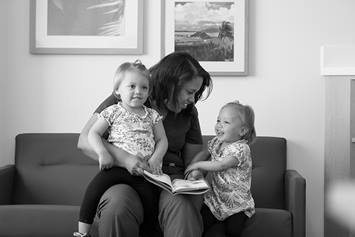Hitting Harms, Hugging Helps
July 6, 2020

From: Nationwide Children's Hospital
Here are tips to help when you or your child are running out of patience.
When patience wears out, please remember hitting harms, hugging helps.
For babies:
- sing to your baby
- swaddle and rock your baby
- ask to take your baby on a walk up and down the hall
- change the baby’s position and/or location
- turn off the lights in a private room if you need to
For 2 year olds:
- ask if there are books available to read to your toddler
- offer realistic choices as you wait to give your toddler a sense of control
- toddlers have short attention spans and waiting is hard for them, praise them for positive behaviors
- sing nursery rhymes or other songs with hand gestures
For 4 year olds:
- preschoolers are still developing their sense of time
- praise your preschooler for positive behaviors, acknowledge when they wait with patience
- calm your preschooler with gentle touch, rubbing their hand or back
- play i-spy or practice writing or drawing as you wait
Hitting can have long term effects on your child’s body, mind and spirit. Here are better options:
- Time-out
- Distraction
- Sticker charts
- House rules
- Logical consequences and explain why
Calming Down Together
- Get on your child’s eye level
- Hug your child
- Use rhythmic motion to pat your child’s back or arm
- Sing your favorite song together
- Turn off the lights in a private room if you need to
- Ask for a blanket and get cozy together
Try Discipline That Works
- Set the ground rules
- Talk to your children about the rules
- Make sure they understand what you expect of them and why
- Enforce the rules consistently
- Praise your child for good behavior
Look For Good Behaviors
- Reward good behaviors
- With a hug or kiss
- With praise
- With a smile
- Children behave well when they feel good about themselves!
It helps to have realistic expectations of behavior.
Wondering if your expectations match your child’s abilities and age? Here’s a look at age-related expectations…
Babies:
- I feel safest with people I know.
- I like to be held. It makes me feel secure.
- I can sense when you are stressed.
- I put everything in my mouth because it soothes me and helps me explore.
- I cry a lot, trying to express myself or trying to communicate.
- My brain is still developing. Please hold me gently.
2 year olds:
- I can make big messes, really quickly.
- My attention span is short and I sometimes need help thinking of things to do.
- I am emotional, and can cry over little things.
- I like to assert my independence and say “no!”
- I may cry or hit or bite to express how I am feeling.
4 year olds:
- I have a short attention span. I get bored within minutes.
- I can talk but cannot always express my wants and needs.
- I’m learning how to control my emotions. I learn most from adults around me.
- I thrive on positive feedback.
- I like to be listened to. Try to understand what I am saying.
7 year olds:
- I may test you by lying or telling stories.
- I get frustrated because I cannot say exactly how I am feeling.
- I can be emotional and need help with my emotions.
- I like to make choices and also like to help you when I’m asked.
- I need a role model to help me decide between good and bad.
Kids Are Kids
They can’t always sit still or do what we want them to do. Being tired, hungry or overstimulated can bring out bad behavior.
Please remember, hitting can harm, hugging can help.
« Back to News
